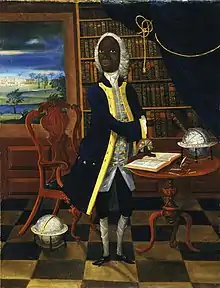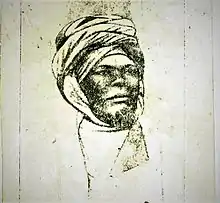The Black elite is any elite, either political or economic in nature, that is made up of people who are of Black African descent. In the Western World, it is typically distinct from other national elites, such as the United Kingdom's aristocracy and the United States' upper class.
United Kingdom



In the United Kingdom, the black community has largely consisted of immigrants and their descendants whose residency in the country dates from either the time of the old Empire or that of the new Commonwealth. Persons classified as being of African descent have nevertheless been a recognizable component of British society since at least the Elizabethan period.[1]
An elite developed within the community over the course of several centuries. Its ranks were increased over time by the mixed-race children of colonial British aristocrats (such as Dido Elizabeth Belle),[2] members of the older black elites of British Africa and the Caribbean (such as Sara Forbes Bonetta),[3] the rise of black and mixed-race national leaders (such as Paul Boateng),[4][5] and the success of numerous black and mixed-race persons in specialized industries, such as the arts (for example, Lenny Henry).[6]
Like their counterparts in the United States and elsewhere, members of the black elite historically took part in the campaign to abolish slavery in the empire. Some, such as former enslaved African Olaudah Equiano, even became politically prominent by way of their efforts.[7]
Following the abolition in the early 1800s, black people continued to gain prominence in Britain's social, political and cultural life. Mary Seacole was a heroine of the Crimean War,[8] and Learie Constantine was an important cricketer.[9]
Today, Britain's black and mixed-race people are included in the annual Powerlist—a ranking of the nation's most prominent people of color.[10] A number of them, such as Boateng and Henry, have been made peers and/or knights of the realm. There is also a small community of British aristocrats that are of partially black descent. Emma Thynn (née McQuiston), the Marchioness of Bath as the wife of the 8th Marquess, belongs to this sub-group.[11] Other notable members are Prince Archie of Sussex and Princess Lilibet of Sussex, the mixed-race children of Prince Harry and Meghan Markle, the Duke and Duchess of Sussex.
United States


.jpg.webp)
In the North of the United States, many educated black people (taking advantage of their relative freedom)[12] took part in abolitionist and suffragist activities. They also provided support to stations of the Underground Railroad prior to the abolition of slavery. Later, during the Reconstruction Era, a number of them took part in various professions and grew quite wealthy in places including Brooklyn.[13]
In the South, an elite started forming before the American Civil War among free black people who managed to acquire property. Of the free people of color in North Carolina in the censuses from 1790 to 1810, 80 percent can be traced to African Americans free in Virginia during the colonial period. Most were descended from unions between free white women and enslaved or free Africans or African Americans. Free black people migrated into frontier Virginia and then to other states over several generations in the colonial period, as did many of their neighbors. Extensive research into colonial court records, wills and deeds has demonstrated that most of those free families came from relationships or marriages between white women, servant or free, and black men, servant, free or slave. Such relationships were part of the more fluid relationships among the working class before the boundaries of slavery hardened.[14]
During slavery times, white slaveholders and others were known to rape enslaved African women, fathering mixed-race children. There were also slaveholders who had caring relationships, common-law marriages, and legal marriages to enslaved black women. They sometimes freed such women and their children. Some slaveholders did provide for their mixed-race children by ensuring they were educated; in the earliest periods, they might be apprenticed to a trade or craft. In some cases, fathers arranged to settle property on their "natural" children. Whatever property the father passed on to the child was important in helping that person get a start in life. These mulattos in turn patterned their subsequent lives after "polite" white society. In some places, such as New Orleans, this coalesced into what was known as Plaçage.[15][16]
In the South, the free black elite often took leadership roles within the church, black schools, and community. Natural leaders rose up from many different classes. Some developed catering businesses or other services that enabled them to take advantage of their white contacts through family and other connections. The black elite also enjoyed the benefits of living within the white neighborhoods, which further isolated them from the darker-skinned African Americans and which caused many of them to blame them for the downward shifts in life-style choices. Some lighter skinned black people even passed for white, and were assimilated into white society thereafter.[17]
The Civil Rights Movement and affirmative action brought about many changes for the black elite. As the old elite died away, a new black elite emerged. Within its ranks are politicians, entrepreneurs, actors, singers, sports figures, and many more who are otherwise part of America's wider upper-middle class. The political leaders Barack Obama and Kamala Harris are prominent members of this new elite.[18]
Other examples



In addition to those already cited, groups from around the world that either are or once were generally thought to constitute a Black elite include:
- Abirus
- Affranchis
- Afro-Bolivian monarchy
- Aguda people
- Americo-Liberians
- Andriana
- Angolan Mestiços
- Aro Igbos
- Assimilados
- Black Loyalists
- Black Patriots
- Children of the Plantation
- Creoles of Color
- Dahomeyan Fons
- Egba Alake Yorubas
- Emancipados
- Ethiopian nobility
- Évolués
- Fernandino peoples
- Ganwas
- Gbara clans of Mali
- Ghanaian chieftaincy
- Gold Coast Euro-Africans
- Kumasi Ashantis
- Links
- Masonic Order of Liberia
- Mourides
- Mulatto Haitians
- National Pan-Hellenic Council
- Nigerian bourgeoisie
- Nigerian chieftaincy
- Oyo Yorubas
- Pardo Brazilians
- Prazeros
- Prince Hall Freemasons
- Reformed Ogboni Fraternity
- Saro people
- Shirazis of the Swahili Coast
- Siddis of Janjira and Jafarabad
- Sierra Leone Creole people
- Sigma Pi Phi
- South African Inkosis
See also
- Aristocracy (class)
- Aristocracy (system)
- Elitism
- Nouveau Riche
- Old Money
- Upper class
References
- ↑ Kaufmann, Miranda (22 September 2017). "Black Tudors". Financial Times. Retrieved October 10, 2020.
- ↑ "UK director brings 18th century black aristocrat to big screen". france24.com. 30 April 2014. Retrieved October 10, 2020.
- ↑ "The African Princess Sarah Forbes Bonetta". blackhistorymonth.org.uk. Retrieved October 10, 2020.
- ↑ "Paul Boateng". Britannica.com. Retrieved October 11, 2020.
- ↑ "Black MPs tell of being confused with other politicians". The Guardian. January 12, 2020. Retrieved October 10, 2020.
- ↑ "BAME Screen Test: Does British TV Lack Diversity?". campaignlive.co.uk. Retrieved October 10, 2020.
- ↑ "Black Abolitionists and the end of the transatlantic slave trade". blackhistorymonth.org.uk. Retrieved October 10, 2020.
- ↑ "Mary Seacole". bbc.co.uk. Retrieved October 10, 2020.
- ↑ "Constantine, Sir Learie (1901–1971)". English-heritage.org.uk. Retrieved October 10, 2020.
- ↑ "Meghan Markle and Stormzy named amongst Britain's most influential black people". independent.co.uk. 25 October 2019. Retrieved October 10, 2020.
- ↑ "Britain's first black aristocrats". Retrieved May 22, 2021.
- ↑ "Free Negroes and Mulattoes". primaryresearch.org. 16 February 2009. Retrieved October 10, 2020.
- ↑ "'The Gilded Age' explores a rarely seen chapter of Black history". The New York Times. February 14, 2022. Retrieved February 19, 2022.
- ↑ Paul Heinegg, Free African Americans in Virginia, North Carolina, Maryland and Delaware
- ↑ Chained to the Rock of Adversity, To Be Free, Black & Female in the Old South, edited by Virginia Meacham Gould, University of Georgia Press, 1998.
- ↑ "Tripod Mythbusters: Quadroon Balls and Plaçage". wwno.org. Retrieved October 11, 2020.
- ↑ "A Chosen Exile:Black people passing in White America". npr.org. Retrieved May 23, 2021.
- ↑ "America's Black upper class and Black Lives Matter". The Economist. Retrieved May 23, 2021.
Notes
- Benjamin, Lois, The Black Elite, Chicago: Nelson-Hall Publishers, 1991.
- Landry, Bart, The New Black Middle Class, University of California Press, 1987, ISBN 9780520064652.
Further reading
- Birmingham, Stephen. Certain People: America's Black Elite, New York, NY: Little Brown & Co., 1977.
- Frazier, E. Franklin. Black Bourgeoisie, New York, NY: Fress Press, 1997.
- Gatewood, Willard B. Aristocrats of Color: The Black Elite, 1880-1920, Arkansas: University of Arkansas Press, 2000.
- Graham, Lawrence. Our Kind of People: Inside America's Black Upper Class, New York, NY: HarperCollins Publishers Inc., 1999.
- Major, Gerri. Black Society, Chicago: Johnson Publishing Company, Inc., 1977.
- "Probing the Black Elite’s Role for the 21st Century", The Black Commentator, Issue 134. Retrieved April 30, 2007.
- Evangeline Holland, "The Black Elite in America", Edwardian Promenade, February 25, 2010.